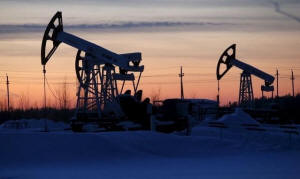|
 Oil
output freeze deal talks should end by March 1, says
Russian minister Oil
output freeze deal talks should end by March 1, says
Russian minister
 Send a link to a friend
Send a link to a friend
[February 20, 2016]
MOSCOW (Reuters) - Consultations on
a preliminary deal between leading oil producers to freeze output should
be concluded by March 1 after a group led by Russia and Saudi Arabia
reached a common position this week in Doha, Russia's energy minister
said.
|
|
 In a television interview aired on Saturday, Alexander Novak also
said that the agreement announced on Feb. 16 was weighty enough. In a television interview aired on Saturday, Alexander Novak also
said that the agreement announced on Feb. 16 was weighty enough.
"Those countries which have openly supported this approach are
producing around 75 percent out of global (oil) export volumes. My
point is that, in practice, this is enough to agree," Novak told the
Vesti on Saturday program.
Russia, Saudi Arabia, Qatar and Venezuela said this week after talks
in Doha that they were ready to freeze production at January levels
if other producers do the same.
Iran welcomed the deal. But it stopped short of saying it would
itself freeze production at January levels and its deputy oil
minister said on Saturday it would increase production soon.
Novak said talks between Venezuela and Iran were still ongoing, and
said consultations would also be held with non-OPEC countries,
including Mexico and Norway.

"I believe that they (Mexico and Norway) would take a constructive
stance," he said.
If additional oil were not supplied to the market, then the global
surplus of oil would fall by at least 1.3 million barrels per day,
Novak added.
WITH OR WITHOUT IRAN?
Novak said Iran had taken a relatively constructive stance on the
Doha deal but not yet said it was ready to sign up to the proposals.
Its Deputy Oil Minister Rokneddin Javadi was quoted as saying on
Saturday that Tehran aimed to increase oil production by 700,000
barrels per day in the near future.
[to top of second column] |

Alexey Texler, Russia's first deputy energy minister, said earlier
this week that even without Iran there would be an effect from the
deal.
According to Texler, Russia is talking about freezing January
production levels. January output was around 1.5 percent higher than
the annual average for 2015.
Novak also said it was "discussed with colleagues" that an oil price
of $50 per barrel would suit consumers and exporters in the long
term. He did not elaborate.
The minister believes that if the Doha agreement enters into force
then Russia's market share would remain unchanged.
(Reporting by Alexander Winning and Maria Kiselyova; Writing by
Polina Devitt and Denis Pinchuk; Editing by John Stonestreet)
[© 2016 Thomson Reuters. All rights
reserved.] Copyright 2016 Reuters. All rights reserved. This material may not be published,
broadcast, rewritten or redistributed.
 |